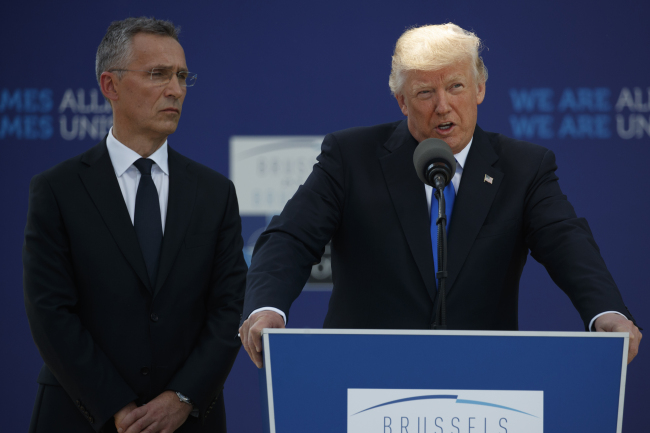Washington has recently finalized a four-point policy plan on North Korea that calls for applying “all available sanctions and pressure” to incite the country to change its course and ultimately resolve the nuclear standoff through dialogue, South Korean lawmakers said Thursday.
Joseph Yun, special representative for North Korea policy at the US State Department, introduced the plan to a group of visiting lawmakers led by Rep. Kim Kwan-young of the minor opposition People’s Party.
 |
(Yonhap) |
The department established four principles on North Korea: it will not recognize the communist country as a nuclear weapons state; impose all available sanctions and pressure; pursue no regime change; and resolve the problem through dialogue.
The guidelines reflect the department’s efforts to flesh out the so-called “maximum pressure and engagement” policy line unveiled earlier. US President Donald Trump approved a comprehensive report detailing the strategy about two weeks ago, Kim quoted Yun as saying.
While leaving open the possibility for talks, Yun stressed the current focus should stay on sanctions and pressure and that there would be no dialogue before Pyongyang shifts its attitude toward denuclearization.
“The department officials questioned the possibility that the North would agree to talks, saying we should continue the sanctions campaign given no change in the North’s position,” the lawmaker told reporters in Washington.
This may indicate possible future discord between Seoul and Washington, with President Moon Jae-in looking to a restart of inter-Korean dialogue and economic and humanitarian exchanges including the Kaesong industrial park and tours to Kumkangsan.
The lawmakers also expressed concerns about the confusion in South Korea over the ongoing deployment here of the US’ Terminal High Altitude Area Defense system. Moon has pledged to seek parliamentary approval for the program but his ruling Democratic Party of Korea remains opposed to it.
“It seemed if the THAAD dispute escalates to the extent where the deployment decision may be reversed, the US officials would take it very seriously,” Kim said, noting that if put up for a vote, the plan will likely pass.
“The US officials apparently didn’t understand why we debate about a defensive weapon,” said Rep. Jun Hee-kyung of the main opposition Liberty Korea Party.
Democratic Party Rep. So Byung-hoon conveyed skepticism among US academics toward a resumption of the Kaesong and Kumkangsan initiatives in the face of North Korea’s provocations and nuclear development.
“Some of those at think tanks were very negative about their restart, asking what economic benefits South Korea would gain from that,” So said.
By Shin Hyon-hee (
heeshin@heraldcorp.com)







![[Today’s K-pop] Blackpink’s Jennie, Lisa invited to Coachella as solo acts](http://res.heraldm.com/phpwas/restmb_idxmake.php?idx=644&simg=/content/image/2024/11/21/20241121050099_0.jpg)
